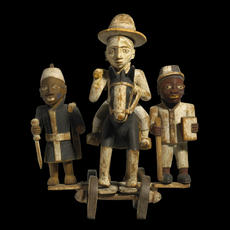They encouraged the exploitation of forest products like rubber, timber, palm oil etc… They also encouraged the planting of new cash crops like cotton and cocoa. In order to facilitate maximum returns in this direction, the British and the French began to provide basic infrastructure and they took other steps to facilitate trade. One of the earlitest steps taken was the development of communications. In the British sector, as early as the 1890's (that is, before the process of subjugation of Yorubaland was fully accomplished, thereby signifying their long term intentions) a lot of money had been spent on the Lagos Harbour to improve shipping facilities. A Public works department had been established as early as 1896. It was charged with responsibilities for the construction and maintenance of public roads and telegraphs, among other things. This department cooperated with various native authorities in building major and minor roads in Yorubaland. Majority of these roads were untarred but they were adequate for the limited number of vehicles available for carrying goods and passengers. The impact of the motor road was at first small. It was only in 1906 that it became possible to travel by road from Lagos to Ibadan. By the 1950's when colonialism was nearing its end, a considerable part of Yorubaland was still in need of good roads.
By contrast, the railway made a more immediate impact. A survey work onit was completed in May 1895 and construction work began in December 1895. Although the railway was planned for a wide area, the immediate area of construction was limited to Yorubaland. Beginning in Lagos in 1895, the railway line reached Ota in 1897 and Abeokuta in April 1899. By December 1899, it had reached Ibadan , a distance of more than 200 kilometres from Lagos. The Lagos-Ibadan line was opened in March 1901. Within the next few years the line traversed Yorubaland, passing from Ibadan to Ede, Osogbo, Ikirun and Ilorin, from where it went beyond Yorubaland to the north.
The important areas that were not reached by the railway were linked by road. The combination of rail and road transportation greatly facilitated the movement of valuable products from Yorubaland to Lagos, from where they were shipped to Britain and a few other European countries.
The new pattern of economic activities that emerged created new occupational opportunities for the Yoruba people. Farming, as in the pre-colonial period, remained the dominant occupation, but it became more intense and more lucrative. Crops were required in greater quantity to meet the increasing demand for home and foreign markets. New cash crops were introduced, including cocoa (whose introduction by missionaries slightly predated the colonial period), coffee, castor oil and teak. Sylvan products like oil palm, rubber, kola nut, timber and shea butter (in Dahomey in particular) were commercialized. Subsistence crops like corn, yams, beans, fruits, peppers etc., became more profitable. All this gave greater incentive to the farmers. However, no effort was made during the colonial period to revolutionize the method of production. In spite of this the new economic activities introduced gave farming a considerable boost in Yorubaland during the colonial period.
But during the colonial period, the introduction of cash crop economy and the establishment of a state control which made the individual rather than the family responsible for his action weakened the extended family system and promoted the growth of individualism. There developed the tendency among individuals to build their own separate houses and live with members of their immediate family. And thereafter slowly through this period the old systems that stabilized the various communities began to erode.
For similar reasons the same fate befell the land tenure system. The desire by individuals to make maximum profit from cash crops and to build separate houses led to the desire to own land on individual basis. Thus the concept and practice of cooperate ownership of land was gradually being lost to the detriment of the old Yoruba social systems.
As the family and land situation shows, not all the changes that took place in the colonial period were positive. New concepts and new patterns of relationship destroyed some of the good values and norms of society. This had an adverse affect on the high moral standards maintained by the Yoruba in the pre-colonial period. On the whole the colonial period witnessed a great transformation of the Yoruba society. Colonial rule brought about economic and social developments, but it carried in its wake certain social evils.
Back to Top


